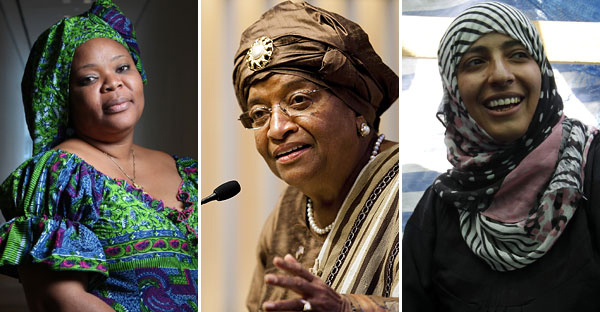 |
| Leymah Gbowee, Ellen Johnson Sirleaf, and Tawakkul Karman share the 2011 Nobel Peace Prize |
Some happy news came last week when three women were awarded the 2011 Nobel Peace Prize for their “non-violent struggle for the safety of women and for women’s rights to full participation in peace-building work.”
Leymah Gbowee has campaigned against rape and for women’s rights in Liberia, and serves as the director of Women Peace and Security Network Africa. According to the Nobel committee, Gbowee “mobilized and organized women across ethnic and religious dividing lines to bring an end to the long war in Liberia, and to ensure women’s participation in elections. She has since worked to enhance the influence of women in West Africa during and after war.” She is featured in the documentary Pray the Devil Back to Hell (which is part of the PBS series Women, War, and Peace). In addition to the Nobel prize, Gbowee has been awarded the Blue Ribbon for Peace by Harvard’s Kennedy School of Government, the John F. Kennedy Profile in Courage Award®, the 2009 Gruber Women’s Rights Prize which honors an individual who has brought about significant advances in the quest for peace and gender equality in Africa, the John Jay Justice Award, the Livia Award from the Livia Foundation in Denmark, and the World Association of Girls Guide 1st Centenary Award, among others.
To learn more about Leymah Gbowee and other Liberian women who came together to end a bloody civil war and bring peace to their shattered country, watch the film. Here’s the trailer:
Ellen Johnson Sirleaf is the President of Liberia, and is the first democratically-elected woman in Africa. The Nobel committee stated that “since her inauguration in 2006, she has contributed to securing peace in Liberia, to promoting economic and social development, and to strengthening the position of women.” Her award didn’t come without controversy, as seems usual for a sitting president (such as when Barack Obama was awarded the prize), and was seen by some as merely a political endorsement by the selection committee. Watch a TED Q&A with Sirleaf, in which she discusses women in leadership (which I’m unable to embed here), or an interview with Time:
Tawakkul Karman is the first Arab woman to win the Nobel Peace Prize, for her democracy activism in Yemen, and one of the youngest women to ever win the prize (at age 32). She heads the organization Women Journalists Without Chains (WJWC), which advocates for human rights and freedom of the press. The Nobel committee said of Karman, “In the most trying circumstances, both before and during the “Arab spring”, Tawakkul Karman has played a leading part in the struggle for women’s rights and for democracy and peace in Yemen.” This past April, Karman wrote an article, “Our Revolution’s Doing What Saleh Can’t–Uniting Yemen” for The Guardian, in which she says,
After a week of protests I was detained by the security forces in the middle of the night. This was to become a defining moment in the Yemeni revolution: media outlets reported my detention and demonstrations erupted in most provinces of the country; they were organised by students, civil society activists and politicians. The pressure on the government was intense, and I was released after 36 hours in a women’s prison, where I was kept in chains.
Here is a clip from Democracy Now, which discusses Karman’s activism in Yemen (the focus on Karman begins around the 2-minute mark):
I am thrilled to see these three women honored, and encourage you to learn more about their work (as I will as well).
